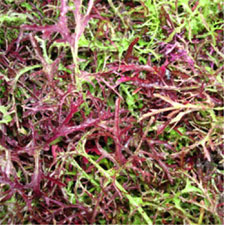Plant of the Month – October, 2010
Mizuna Red Streaks Mustard

Mizuna Red Streaks mustard.
Mizuna Red Streaks mustard is a peculiar fall plant that can light up a container or add an amazing splash of red color to any landscape. This light, airy mustard is popular among gardeners in our part of Texas and is both ornamental and edible! Red Streaks is a rarity for this time of year — a plant that not only is beautiful, but tastes as good as it looks.
Prime harvesting for a nice sweet taste of Asian zing should occur within 20 days of germination. This timing will yield a sweet, light peppery addition to any salad or stir-fry. After 40 days’ maturity, you can expect a slightly bittersweet taste, which still can add flavor to any salad or Asian cuisine.
Ornamentally, this mustard has the ability to withstand all types of weather. I have seen Mizuna Red Streaks mustard at top performance for the last three fall and winter seasons, and in our unique climate, that is an impressive feat. I enjoy displaying Mizuna Red Streaks in a container with stock, pansy, viola, snapdragons, or kale. Red Streaks can be an amazing welcome beside the front steps leading into your home after a long day’s work.
With its rays of burgundy, red airy color, and streaks of pure lime-green, this plant offers many possibilities. When you start to make dinner, go outside and pluck some Mizuna Red Streaks to add that perfect Asian twist to your dinner salad. You’ll enjoy taking a “two-dimensional” approach to fall and winter gardening with this uniquely flavorful and ornamental complement to any salad or stir-fry.
Mizuna Red Streaks seed can be purchased at Harris Seed (www.harrisseeds.com). Gardeners of any level can find success growing this mustard. Not only is it easy to cultivate from seed, it is as close to instant gratification as one can get! Go out on a limb and try something new. Mizuza Red Streaks mustard will be a standout for you this winter.
About the author: Jenny Wegley is the research and greenhouse manager at the Dallas Arboretum. Visit www.dallasplanttrials.org for more information on plant trials at the Arboretum.

